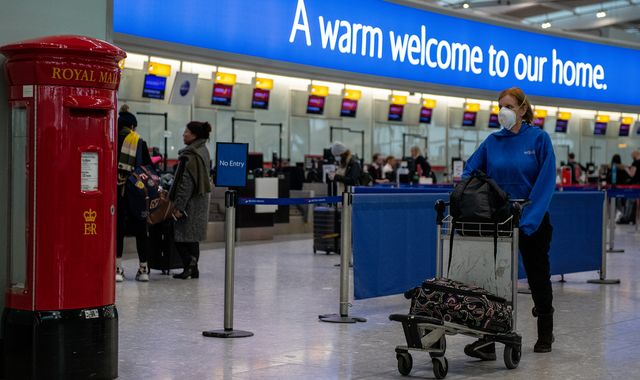Coronavirus: Britons advised to avoid all non-essential foreign travel for 30 days
Written by News on 18/03/2020
Britons have been advised to avoid all non-essential foreign travel for 30 days as the coronavirus pandemic continues.


Foreign Secretary Dominic Raab said the “fast-changing international circumstances” of the worldwide outbreak of COVID-19, the disease caused by the coronavirus, required changes to the official travel advice.
It comes as the number of confirmed cases in the UK reached 1,950 – up 407 in the last 24 hours – and another 14 people died, taking the figure to 71.
“UK travellers abroad now face widespread international border restrictions and lockdowns in various countries,” Mr Raab told MPs in the Commons.
“The FCO [Foreign and Commonwealth Office] will always consider the safety and the security of British nationals, so with immediate effect I’ve taken the decision to advise British nationals against non-essential travel globally for an initial period of 30 days and of course subject to ongoing review.”
Britons who travel abroad should be “fully aware of the increased risks of doing so”, the FCO said.
“That includes the risk that they may not be able to get home, if travel restrictions are put in place.
“Anyone still considering travel to be realistic about the level of disruption they are willing and able to endure, and to make decisions in light of the unprecedented conditions we face.”
At this stage, the FCO is not currently advising all British people abroad to return home, except for a small number of countries already contained in its travel advice.
:: Listen to the Daily podcast with Dermot Murnaghan on Apple Podcasts, Google Podcasts, Spotify, Spreaker.
“However, British people should keep in mind that flights may be cancelled at short notice or other travel restrictions may be put in place by foreign governments,” the department warned.
The global picture has seen 430 changes to Foreign Office travel advice in the last week – more than in the whole of 2019.
Mr Raab told MPs: “This decision has been taken based on the domestic measures introduced in the UK alongside the changes to border and a range of other restrictions which are now being taken right around the world.
“The speed and the range of those measures across other countries is unprecedented, some of those decisions are being made without notice.
“In some countries, even in countries or particular areas where there haven’t yet been any reported cases of COVID-19, local authorities are nonetheless imposing restrictions on movement and again doing so with little or sometimes no notice.”
The announcement comes after the European Union unveiled plans for a 30-day ban on non-residents entering the bloc, restrictions that are not expected to apply to Britons.
Airlines have cancelled thousands of flights and revealed plans to ground the majority of their planes in recent days.
Tim Alderslade, chief executive of trade body Airlines UK, said the Foreign Office’s decision was “no surprise given recent developments” but warned it will cause “yet more uncertainty with demand set to plummet still further”.
Labour’s Emily Thornberry said Britain had been part of a “failure of global leadership and co-ordination” in its response to COVID-19.
The shadow foreign secretary said changes to Foreign Office travel advice have been “so slow” to match the situation on the ground, adding that consular support has also been “out of step” with demand.
She called for clearer guidance from the government on what constitutes essential travel.
Ms Thornberry cited the experience of her constituent Tom, who is one of 65 nationals stuck in Peru, a nation that has closed its borders.
She said: “Tom’s flight today to Britain is cancelled and his calls to our embassy in Lima have not been answered.
“And why is that? Because the embassy itself has decided to close down for 15 days just when its services were needed most.
“The secretary of state said in his statement that our consular teams are working around the clock to provide the best information to UK nationals, well I’m afraid that simply isn’t the case in Tom’s experience.”
Ms Thornberry said the government “cannot keep passing the buck to others”, particularly on repatriation.
She added: “Why were there no clear protocols already in place on the plans for evacuation and repatriation on the event of an outbreak such as this, and if those protocols were in place, why were they not followed?
Ms Thornberry concluded: “When the dust settles on this crisis, as we all hope it eventually will, we will reflect on what has been a chronic failure of global leadership and co-ordination in which our own government has sadly been one of the parties.”
Mr Raab, in his reply, said: “Ultimately, the way travel advice is given by the Foreign Office is that the decision on whether to travel nonetheless remains an individual decision.
“Travellers may have urgent, particularly exceptional business, family or commercial or otherwise, and circumstances differ. But what we are doing is strongly advising against travel globally.”
Mr Raab said the government is “liaising with the tour operators and airlines” and added: “Given the volume, we don’t have precise numbers, but the volume of people, British nationals who are abroad, not permanently, not living abroad necessarily, but travelling abroad – to expect that the government can repatriate them all I think would be unrealistic.
“What we do do is make sure we’re in a position to protect the most vulnerable.”
(c) Sky News 2020: Coronavirus: Britons advised to avoid all non-essential foreign travel for 30 days






